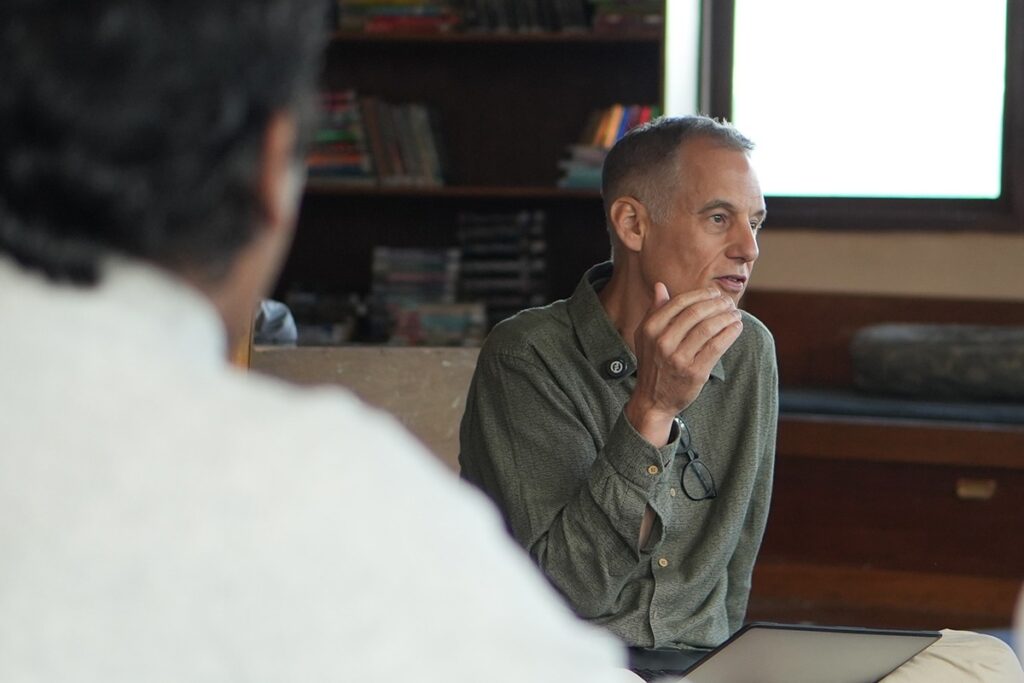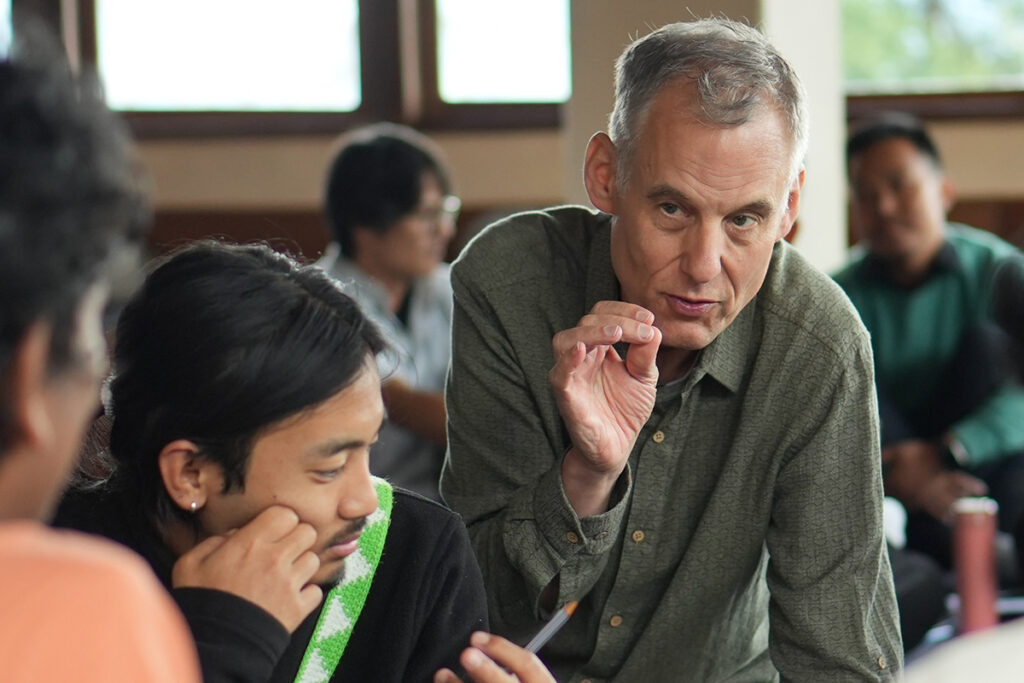The New Last Mile of Leadership: Harnessing What AI Can’t Reach
As artificial intelligence accelerates its role in business, a paradox emerges. The systems that promise greater efficiency are simultaneously distancing decision-makers from the human contexts that sustain performance. While AI can process vast amounts of data, it remains blind to the lived conditions where trust, ownership and resilience actually form.
This gap between computational power and contextual understanding represents what Daniel Hewett calls “the new last mile” of leadership. It is where systemic insight and judgment become most consequential.

The Consequences of Distance
Hewett, a design strategist and founder of Ocular, has spent a decade studying what happens when organizations lose connection to the environments that give their work meaning. The pattern is consistent: teams lose sight of what matters. Purpose erodes. Ownership dissipates.
What follows is a downward spiral. When leaders can no longer see or articulate why their work is relevant, the people executing that work feel it first. Initiatives lose momentum. Innovation becomes risk rather than opportunity. Organizations find themselves executing strategies no longer connected to the conditions they were meant to address.
“In complex markets,” Hewett observes, “an organization’s ability to thrive depends entirely on its relevance, its capacity to respond to conditions as they actually exist, not as they appear in reports.”
The pattern repeats across industries. Leaders fixate on visible outputs such as products, metrics and deliverables, while the forces shaping those outcomes remain invisible. Hewett calls this the “Object Trap.” As organizations scale, reports replace relationships and context collapses into data. Leaders solve for symptoms such as lagging performance, poor adoption and stalled innovation without addressing the underlying conditions that produce them.
The risk is universal. Every leader operating in complex systems faces the same gravitational pull toward abstraction.
Why We Fly
The shift Hewett advocates is evident in his work with an aircraft manufacturer. The company’s project brief was straightforward: redesign cabin interiors—seats, fixtures and surfaces. Standard object-level thinking.
Rather than accepting the brief as written, Ocular posed a deeper question, one that framed a more consequential inquiry: Why have people always wanted to fly?
That question revealed an entirely different challenge. Instead of competing through incremental improvements in a crowded field, the company could redefine what the experience itself meant. The result was a cabin conceived around access to natural light, attunement to the cultural and business contexts of global travel and a new level of adaptive comfort.
“The principle,” Hewett explains, “is to build frameworks of value expansive enough to generate insights far beyond the questions most leadership teams know how to ask.”
Getting to What Matters
This reframing process follows what Hewett calls the IRIS System, a method for developing systemic insight by moving perception through three progressive levels.
- Form examines what is visible: the products, services, and objects that can be measured, counted and sold.
- Frame reveals how those objects relate to larger contexts and how meaning and behavior arise from relationships.
- Flow exposes the invisible systemic currents such as trust, fear, care, and ownership that determine how systems actually behave.
Most leaders operate exclusively at Form. Some reach Frame. Few consistently work at Flow.
In healthcare, for instance, credibility functions as a cross-cutting force. Gaining it requires understanding of how it moves through social systems, not through better messaging but through the right intermediaries. In one public health project, that meant working with community health workers who could build legitimacy within specific communities. The solution wasn’t a better message. It was understanding the flow of credibility itself.

What AI Still Can’t See
Artificial intelligence excels at pattern recognition in existing data. But it has no access to the lived world. It cannot stand in a waiting room and sense the tension of uncertainty. It cannot feel the difference between compliance and commitment. It cannot observe how confidence forms or fails in real time.
“AI can process data,” Hewett says, “but it will never know the context the way a leader will if they go there. That’s the last mile.”
The human capacity to interpret these signals, what Hewett calls “contextual intelligence,” cannot be automated or delegated. It requires direct exposure to the environments where decisions have consequences.
The next generation of global leaders will inherit a world in which artificial intelligence is not an auxiliary tool but the environment itself, pervasive, fast and increasingly decisive. Their challenge will not be to compete with algorithms but to lead meaningfully within systems shaped by them. That will demand the one capacity no machine can replicate: building organizations able to integrate and interpret context, and act with discernment amid complexity.
Tokyo – A Living Laboratory
To cultivate this capacity, Hewett uses what he describes as “living laboratories,” not simulations or case studies but real contexts where dynamic forces are in motion. Markets, service counters and waiting rooms become places where the hidden mechanics of relevance, trust and adaptation can be seen most clearly.
These unlikely settings reveal what no dataset can: how systems behave when they meet reality. The practice is deliberate, moving leaders out of abstraction and back into contact where strategy and consequence converge.
In March, Hewett will bring this approach to Tokyo for a one-day Field Studio at DMO Tokyo/Marunouchi. The studio forms the centerpiece of a multi-part program that begins with an online orientation and continues afterward through individual and group coaching. The sequence is designed for the next tier of global leaders preparing to navigate an AI-saturated economy. Participants from diverse sectors will work directly with the IRIS framework in live environments, learning to recognize the systemic forces that shape outcomes in real time.
It is not a seminar but a field immersion, an integrated learning experience that builds practical capacity through preparation, direct engagement and reflection. For emerging leaders, it offers a rare opportunity to develop the kind of perception that will define the next decade of leadership.
Key Value Propositions:
- Risk Reduction: Provides access to impactful decisions without greater risk.
- Frictionless Implementation: The work is designed to be done inside the workflow of what teams are already doing, making it inexpensive and high-value.
- Team Empowerment: Leaders are strategically positioned to discover this process for their teams, ensuring the people they rely on for success become more successful.
Quick Questions:
Who is this program for?
The program is explicitly designed for up-and-coming leaders and the next generation of executives who want to harness new advantages in complex markets.
How does this skill compare to AI capabilities?
With AI, much is possible, but what’s not possible is the “last mile” advantage. AI can never know context the way a leader will if they go there. This program rebuilds the leadership capacity to leverage Systemic Insight.
What is the final takeaway for registration?
Join a select group of leaders in the living laboratory of Tokyo where trust, ownership and resilience actually live.”

